14 start with U start with U
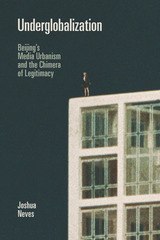

For some time, the United States has been engaged in a national debate over affirmative action policy. A policy that began with the idea of creating a level playing field for minorities has sparked controversy in the workplace, in higher education, and elsewhere. After forty years, the debate still continues and the issues are as complex as ever. While most Americans are familiar with the term, they may not fully understand what affirmative action is and why it has become such a divisive issue.
With this concise and up-to-date introduction, J. Edward Kellough brings together historical, philosophical, and legal analyses to fully inform participants and observers of this debate. Aiming to promote a more thorough knowledge of the issues involved, this book covers the history, legal status, controversies, and impact of affirmative action in both the private and public sectors—and in education as well as employment.
In addition, Kellough shows how the development and implementation of affirmative action policies have been significantly influenced by the nature and operation of our political institutions. Highlighting key landmarks in legislation and court decisions, he explains such concepts as "disparate impact," "diversity management," "strict scrutiny," and "representative bureaucracy." Understanding Affirmative Action probes the rationale for affirmative action, the different arguments against it, and the known impact it has had. Kellough concludes with a consideration of whether or not affirmative action will remain a useful tool for combating discrimination in the years to come.
Not just for students in public administration and public policy, this handy volume will be a valuable resource for public administrators, human resource managers, and ordinary citizens looking for a balanced treatment of a controversial policy.
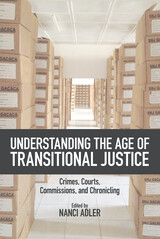
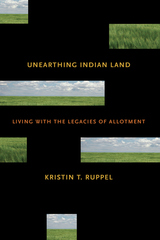
Under the General Allotment Act of 1887, also known as the Dawes Act,individual Indians were issued title to land allotments while so-called “surplus”Indian lands were opened to non-Indian settlement. During the forty-seven years that the act remained in effect, American Indians lost an estimated 90 million acres of land—about two-thirds of the land they had held in 1887. Worse, the loss of control over the land left to them has remained an ongoing and insidious result.
Unearthing Indian Land traces the complex legacies of allotment, including numerous instructive examples of a policy gone wrong. Aside from the initial catastrophic land loss, the fractionated land ownership that resulted from the act’s provisions has disrupted native families and their descendants for more than a century. With each new generation, the owners of tribal lands grow in number and therefore own ever smaller interests in parcels of land. It is not uncommon now to find reservation allotments co-owned by hundreds of individuals.Coupled with the federal government’s troubled trusteeship of Indian assets,this means that Indian landowners have very little control over their own lands.
Illuminated by interviews with Native American landholders, this book is essential reading for anyone who is interested in what happened as a result of the federal government’s quasi-privatization of native lands.
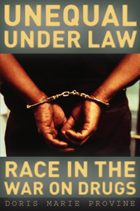
Doris Marie Provine’s engaging analysis traces the history of race in anti-drug efforts from the temperance movement of the early 1900s to the crack scare of the late twentieth century, showing how campaigns to criminalize drug use have always conjured images of feared minorities. Explaining how alarm over a threatening black drug trade fueled support in the 1980s for a mandatory minimum sentencing scheme of unprecedented severity, Provine contends that while our drug laws may no longer be racist by design, they remain racist in design. Moreover, their racial origins have long been ignored by every branch of government. This dangerous denial threatens our constitutional guarantee of equal protection of law and mutes a much-needed national discussion about institutionalized racism—a discussion that Unequal under Law promises to initiate.

Edward J. Behrend-Martinez has studied the transcripts of eighty-three impotency trials conducted by the ecclesiastical court of Calahorra (La Rioja), a Spanish diocese with urban and rural parishes, both Basque and Castilian. From these records, he draws a detailed, fascinating portrait of private life and public sexuality in early modern Europe. These trials were far more than a salacious inquiry into the intimate details of other people’s lives. The church valued marital sex as a cornerstone of stable society, intended not only for procreation but also for maintaining domestic harmony. Every couple’s sex life, however private in practice or intention, was a matter of public and ecclesiastical concern.
Unfit for Marriage offers vivid accounts of marital sex and the role that property, gender, and personal preference played in marriage in early modern Europe. It is essential reading for anyone interested in social history, sexuality, gender studies, canon law, legal history, and the history of divorce in western Europe.

The authors chronicle how millions of Palestinians have been denationalised through the bureaucratic tools of census, population registration, blacklisting and a discriminatory legal framework. They show how identity documents are used by Israel as a means of coercion, extortion, humiliation and informant recruitment. Movement restrictions tied to IDs and population registers threaten Palestinian livelihoods, freedom of movement and access to basic services such as health and education.
Unfree in Palestine is a masterful expose of the web of bureaucracy used by Israel to deprive the Palestinians of basic rights and freedoms, and calls for international justice and inclusive security in place of discrimination and division.
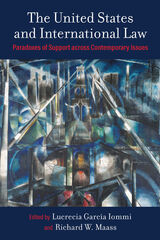
The United States spearheaded the creation of many international organizations and treaties after World War II and maintains a strong record of compliance across several issue areas, yet it also refuses to ratify major international conventions like the UN Convention on the Law of the Sea and the Convention on the Elimination of All Forms of Discrimination Against Women. Why does the U.S. often seem to support international law in one way while neglecting or even violating it in another?
The United States and International Law: Paradoxes of Support across Contemporary Issues analyzes the seemingly inconsistent U.S. relationship with international law by identifying five types of state support for international law: leadership, consent, internalization, compliance, and enforcement. Each follows different logics and entails unique costs and incentives. Accordingly, the fact that a state engages in one form of support does not presuppose that it will do so across the board. This volume examines how and why the U.S. has engaged in each form of support across twelve issue areas that are central to 20th- and 21st-century U.S. foreign policy: conquest, world courts, war, nuclear proliferation, trade, human rights, war crimes, torture, targeted killing, maritime law, the environment, and cybersecurity. In addition to offering rich substantive discussions of U.S. foreign policy, their findings reveal patterns across the U.S. relationship with international law that shed light on behavior that often seems paradoxical at best, hypocritical at worst. The results help us understand why the United States engages with international law as it does, the legacies of the Trump administration, and what we should expect from the United States under the Biden administration and beyond.

One of the most-followed antitrust cases of recent times—United States v. Apple—reveals an often-missed truth: what Americans most fear is competition itself.
In 2012 the Department of Justice accused Apple and five book publishers of conspiring to fix ebook prices. The evidence overwhelmingly showed an unadorned price-fixing conspiracy that cost consumers hundreds of millions of dollars. Yet before, during, and after the trial millions of Americans sided with the defendants. Pundits on the left and right condemned the government for its decision to sue, decrying Amazon’s market share, railing against a new high-tech economy, and rallying to defend beloved authors and publishers. For many, Amazon was the one that should have been put on trial. But why? One fact went unrecognized and unreckoned with: in practice, Americans have long been ambivalent about competition.
Chris Sagers, a renowned antitrust expert, meticulously pulls apart the misunderstandings and exaggerations that industries as diverse as mom-and-pop grocers and producers of cast-iron sewer pipes have cited to justify colluding to forestall competition. In each of these cases, antitrust law, a time-honored vehicle to promote competition, is put on the defensive. Herein lies the real insight of United States v. Apple. If we desire competition as a policy, we must make peace with its sometimes rough consequences. As bruising as markets in their ordinary operation often seem, letting market forces play out has almost always benefited the consumer. United States v. Apple shows why supporting cases that protect price competition, even when doing so hurts some of us, is crucial if antitrust law is to protect and maintain markets.
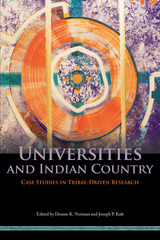
Building on the Harvard Project on American Indian Economic Development’s experience with more than 120 nation-building projects over two decades, Universities and Indian Country posits that the tenets of nation building can provide a strategy for expanding and diversifying universities’ perspectives of knowledge in a multicultural world, while also producing results that are requested by and useful to Native communities.
This groundbreaking volume extends the dialogue begun by the Harvard project, providing another venue for the sharing of knowledge and information. The projects presented address a wide range of topics, including the regulation of genetic research, human resource development, tribal fund-raising, development of tribal museums, and freedom of the press in Indian Country.
Universities and Indian Country’s focus on the concerns and questions of Native communities themselves, provides insight not only into how projects came together, but also into what significance they have to the tribal partners. This compilation is a valuable resource for any student, professional, or community member concerned with issues of nation building and self-determination.
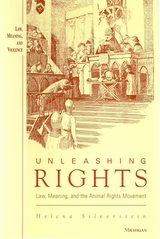
Presented here is an investigation of the legal system through a decentered, cultural approach. Legal languages and practices are viewed as a part of everyday life--constructed, used, and interpreted not only by those who run official legal institutions but also by everyday people with a legal consciousness. Using this approach, the book questions whether the deployment of rights and litigation by animal rights advocates has challenged prevailing legal meaning.
Looking to both the constitutive and instrumental aspects of law, and to how each informs the other, Unleashing Rights finds that the resort to rights and litigation has advanced movement goals and contributed to alternative constructions of legal meaning. The study concludes that despite their many constraints, both rights talk and litigation are powerful resources for those who seek change, especially when used by strategically minded activists.
Unleashing Rights is a book that illustrates the relationship between law, social movement activism, and social change. The book joins the ongoing debate within public law scholarship that is concerned with the effectiveness of legal strategies and languages. The book also speaks to those interested in the general study of social movements and in the particular study of the animal rights movement. With its cultural approach focused on rights language and the construction of meaning, the work will be of interest to the disciplines of law and political science, as well as those who study sociology, anthropology, and philosophy.
Helena Silverstein is F. M. Kirby Assistant Professor of Government and Law, Lafayette College.
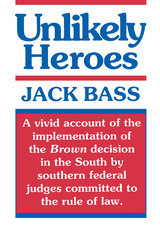
A vivid account of the implementation of the Brown decision in the South by southern federal judges committed to the rule of law.
Bass's unlikely heroes are the federal judges-primarily those on the U.S. Fifth Circuit Court of Appeals-who vigorously and skillfully implemented Brown v. Board of Education in six southern states. The rich profiles show the character of the men who gave up prosperous lives, popularity, and friends to see that the constitutional rights of all citizens were protected.
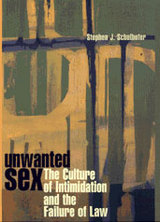
Despite three decades of intense scrutiny and repeated attempts at ambitious reform, our laws against rape and sexual harassment still fail to protect women from sexual overreaching and abuse. What went wrong? In this original, provocative, and enlightening work, Stephen Schulhofer, a distinguished scholar in criminal law, shows the need to refocus our laws against rape and to create a new system of legal safeguards against interference with sexual autonomy.
Our laws provide comprehensive protection for property rights, labor, and other important interests, but sexual autonomy—the right to choose freely whether and when to be sexually intimate with another person—is devalued and ignored. With vivid examples, including stranger assaults, date rapes, and sexual encounters between job supervisors and subordinates, teachers and students, doctors and patients, lawyers and clients, Schulhofer shows that recent reforms of rape and sexual harassment law are overrated and inadequate. From the excessive degree of force necessary for an aggressive action to be defined as rape, to the gray areas in which coercion and exploitation can be used to elicit a false but legally valid “consent,” Schulhofer offers a clear analysis of the limits of current standards. His proposals for a radically different approach hold the promise of genuine respect and effective protection for the sexual autonomy of both women and men. It is an ambitious yet sensible vision, committed to allowing willing partners to seek consensual relationships, while fully protecting each person’s right to refuse sexual encounters that are not genuinely desired.
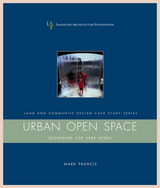
Research has shown that successful public spaces are ones that are responsive to the needs of their users, are democratic in their accessibility, and are meaningful for the larger community and society. While considerable research has been done on needs and conflicts in open space, no one document integrates all this knowledge and makes it available to professionals, students, and researchers.
Based on archival research; published case studies; site visits; and interviews with researchers, open space designers, managers, and users, Urban Open Space looks across several seminal studies to glean significant findings and design implications related to user needs and conflicts. It reviews and identifies those critical user needs that must be considered in the planning, design, and management of outdoor spaces, and synthesizes that knowledge into an accessible and useful document.
READERS
Browse our collection.
PUBLISHERS
See BiblioVault's publisher services.
STUDENT SERVICES
Files for college accessibility offices.
UChicago Accessibility Resources
home | accessibility | search | about | contact us
BiblioVault ® 2001 - 2024
The University of Chicago Press









